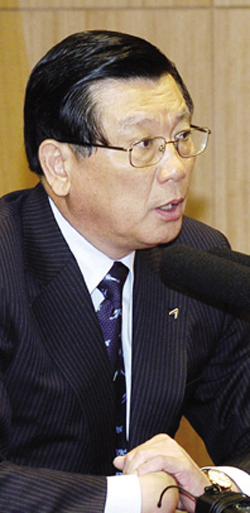New Top Boss at Kumho-Asiana
Former Chmn. Park Sam-koo returns to his former job as CEO of Kumho Asiana Group
 Former Chairman Park Sam-koo returned to the helm of the Kumho Asiana Group, the eighth largest conglomerate in Korea, as of Nov. 1 following a 15-month hiatus from running the conglomerate to avoid further rifts with his brother Park Chan-koo over the management of Kumho Petrochemical and, most importantly, to take responsibility for the group¡¯s financial deterioration, the group said on Nov. 2. The group said the former CEO¡¯s comeback was needed to fill a leadership vacuum that was created by his stepping down in July last year, as the group is faced with many issues to be completed including the management plan for next year.
Former Chairman Park Sam-koo returned to the helm of the Kumho Asiana Group, the eighth largest conglomerate in Korea, as of Nov. 1 following a 15-month hiatus from running the conglomerate to avoid further rifts with his brother Park Chan-koo over the management of Kumho Petrochemical and, most importantly, to take responsibility for the group¡¯s financial deterioration, the group said on Nov. 2. The group said the former CEO¡¯s comeback was needed to fill a leadership vacuum that was created by his stepping down in July last year, as the group is faced with many issues to be completed including the management plan for next year.
Park¡¯s comeback has again made the management system at the group completely orderly, has spurred the restructuring being undertaken for some of the group¡¯s affiliates and has normalized the management structure to turn the group¡¯s operations around. In a nutshell, the group now has an owner to make every crucial management decision.
Park¡¯s return has been a given fact since former Chairman Park Chan-bup retired in August for health reasons, which opened the way for the former boss¡¯s eventual comeback to his old position at the top of the group¡¯s management. In fact, when the former chairman Park retired, Park sent e-mails to the key executives and staff of the group saying that he will return to the group and will rise again with all of their help.
The new boss of the group is likely to preside over the group presidents¡¯ meeting by himself and attend various meetings outside the group as an official top manager of the conglomerate, the group said.
Officials of the group ruled out any immediate personnel shakeup by the chairman, as his comeback has been officially made and nothing else is expected in the near future at the group¡¯s Restructuring Headquarters Office nor in the current lineup of headquarters chiefs.
But Park¡¯s return will create new momentum for the group¡¯s restructuring strategy to support his brother Chan-koo who has been working on the improvement of Kumho Petrochemical with some progress since his return to the top job at the Kumho affiliate in March. An owner¡¯s direct involvement in running the group brings with it the advantage of quick decision making on important management matters. Park¡¯s return has also won the approval of the majority of shareholders and creditors, showing that his comeback will have a positive effect on the group¡¯s management in many ways.
An industry source said the Kumho Group has been under pressure due to bad decisions made by Park and his return could help fix the problems sooner than expected, as he is responsible for many problems the group has been faced with. Kumho Asiana Group decided to put two of its flagship units under a creditor-led debt workout program last year. Kumho Industrial and Kumho Tire have undergone capital reduction and had their debt transformed into equity. Major shareholders of the two companies said they will take responsibility for the mistakes and offered to contribute their own wealth, including shares, to help improve cash flow.
Kumho Petrochemical and Asiana Airlines, which are the holding companies of Kumho Asiana Group, will independently pursue steps to return to profitability, allowing the conglomerate to maintain control of the entire group for now. But if the restructuring is deemed inadequate, Kumho Petrochemical will be placed under creditor control, which would mean a revolution in the conglomerate¡¯s ownership structure. The airline has had a very good third quarter with its sales recording 1.376 trillion won with operating profit rising to 239.1 billion won and before tax profit to 2.2.7 billion won.
A failed strategy to expand via highly-leveraged corporate acquisitions is to blame for the crisis. Kumho jumped from Korea¡¯s 11th-largest to its eighth-largest business group after it acquired a 72.1 percent stake in Daewoo Engineering & Construction in 2006 for 6.4 trillion won and Korea Express for 4.1 trillion won last year. Kumho borrowed 3.5 trillion won from no fewer than 18 different lenders to finance those acquisitions. It offered a 39.6 percent stake in Daewoo as collateral to creditors and even signed a put-back option binding it to repurchase the stake at 31,500 won per share if the stock price falls below that level by the end of 2009. nw
Chairman Park Sam-koo of Kumho Asiana Group.
3Fl, 292-47, Shindang 6-dong, Chung-gu, Seoul, Korea 100-456
Tel : 82-2-2235-6114 / Fax : 82-2-2235-0799